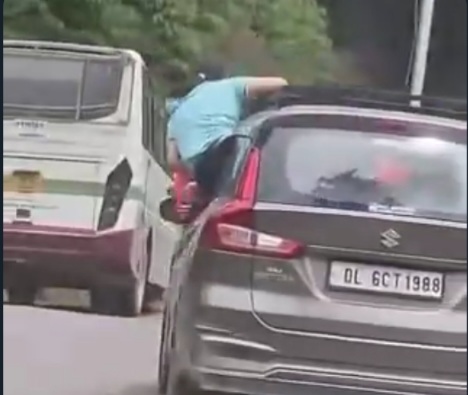Himachal Police is set to Enforce Tough New Towing SOPs: Expect Fines for Illegal Parking. How Public will Take it?
Shimla: The Himachal Pradesh Police will enforce a strict new Standard Operating Procedure (SOP) aimed at clamping down on illegal roadside parking.
Unveiled by Director General of Police Dr. Atul Verma in Shimla, this SOP introduces a Public-Private Partnership (PPP) model to hire cranes for towing illegally parked vehicles, signaling a significant change in the state’s traffic management.
:"We can no longer tolerate vehicles blocking our roads and causing chaos. This new SOP will ensure a smoother flow of traffic and a safer environment for all road users,”said Dr. Verma.
The SOP is the result of a detailed survey conducted by the Traffic, Tourist, and Railway Police Shimla, which identified key hotspots for illegal parking and the extent of the problem.
This survey data has been used to guide the deployment of cranes to the most affected areas informed ASP TTR Narbir Rathour.
Major Highlights of the SOP Include:
1. Survey and Identification:An extensive survey pinpointed areas with high instances of illegal parking.
A comprehensive list of these areas, detailing the average number of vehicles parked illegally, has been prepared to guide enforcement efforts.
2.Hiring of Cranes: Cranes will be hired under a PPP model.
This process involves both community engagement and private stakeholders to ensure effective implementation and operation, making it a collaborative effort aimed at optimizing resources.
3. Implementation Timeline: The process of hiring cranes is expected to be completed within the next one to two months, after which the cranes will be operational.
4.*Operational Guidelines:The SOP provides detailed operational guidelines for crane deployment, towing procedures, and coordination with police personnel to ensure smooth and efficient towing operations.
5. Approval and Distribution: Following approval from the Director General of Police, the SOP will be sent to the Superintendents of Police across all districts in Himachal Pradesh for immediate implementation.
Once cranes are operational, traffic police will use regular patrols, CCTV, and surveillance to identify vehicles parked unlawfully.
If a vehicle is found obstructing traffic, owners will receive a 25-minute warning to move their cars.
Failing to do so will result in the vehicle being towed, with significant fines likely to follow. Although exact fines are not specified, the charges will be substantial enough to discourage illegal parking.
A committee led by the Superintendent of Police will oversee the hiring process, which includes members like the Additional SP/DSP, Traffic In-Charge, Accountant, Line Officer, and Motor Transport Officer (MTO).
This committee will ensure that crane operators are chosen based on their capacity, cost, and geographical suitability.
“Our goal is to keep traffic flowing smoothly and ensure that everyone abides by the rules,” Dr. Verma stated.
“This SOP is a crucial part of our strategy to improve road safety and manage traffic effectively.”
Interestingly, crane operators, who were often found idling or even parking their cranes illegally in places like Dhalli, are expected to benefit from this new initiative.
With the increased demand for towing services, crane operators stand to gain more money.
While some residents are concerned about the reduction of roadside parking options, the police are addressing these issues through public awareness campaigns, stressing the importance of using designated parking areas.
HP Police say SOP represents a step towards better traffic management in Himachal Pradesh, promising immediate and long-term benefits for public safety and road efficiency. How will the puic take it remains to be seen.







